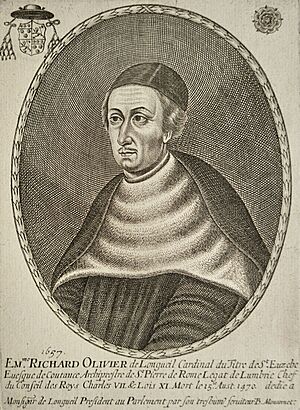Richard Olivier de Longueil facts for kids
Richard Olivier de Longueil (born 1406, died 1470) was an important French leader in the Catholic Church. People often called him the Cardinal of Coutances or the Cardinal of Eu. He served as a bishop and later became a cardinal, which is a very high rank in the Church.
Contents
Early Life and Church Career
Richard Olivier de Longueil was born in Lisieux, France, on December 18, 1406. His family was a well-known noble family from Normandy.
He studied law and became a "protonotary apostolic," which meant he worked closely with the Pope. He also held important jobs in France, like being the president of the Chambre des comptes, which managed government money. He was also a cantor (a church singer and leader) at Lisieux Cathedral.
Later, he became a canon (a type of priest) at Rouen Cathedral and an Archdeacon in Eu. In 1452, the church leaders at Rouen wanted him to become the Archbishop of Rouen, but he said no.
Becoming a Bishop
In 1453, Richard Olivier de Longueil was chosen to be the Bishop of Coutances. He officially became a bishop on September 28, 1453. He promised loyalty to King Charles VII of France in May 1454. He remained the Bishop of Coutances until he died.
Role in Joan of Arc's Retrial
In 1455, Pope Callixtus III asked Bishop Longueil to join a special group. This group was tasked with looking again at the case of Joan of Arc, who had been put to death years earlier. They were asked to clear her name after her death.
The group announced that Joan of Arc was innocent on July 7, 1456, in Rouen. King Charles VII was very happy with this result. He then made Longueil a member of his Grand Conseil, which was a top advisory group. The King also sent him on an important mission to Philip the Good, the Duke of Burgundy.
Becoming a Cardinal
At the request of the King of France, Pope Callixtus III made Longueil a cardinal priest on December 17, 1456. A cardinal is a very high-ranking official in the Catholic Church, just below the Pope.
In 1458, Longueil suggested that a law called the Pragmatic Sanction of Bourges should be removed. This law had given the French king more power over the Church in France. For this action, the Pope praised him, but the French government fined him a large amount of money.
Life in Rome
On August 15, 1461, Richard Olivier de Longueil attended the coronation of the new king, Louis XI of France. Soon after, he left his job as president of the Chambre des comptes.
King Louis XI did remove the Pragmatic Sanction of Bourges. Cardinal Longueil was part of a group sent to Rome to tell the Pope this good news. They arrived in Rome in March 1462. The Pope was pleased and gave Longueil the title to a church in Rome called Sant'Eusebio.
Cardinal Longueil then decided to live in Rome and became a close advisor to the Pope. Because he left France, the King's council stopped his church payments in France.
He took part in the election of a new Pope in 1464, which chose Pope Paul II. The new Pope made Longueil the head priest of St Mark's Basilica in Venice. He also sent him as a special representative (a "papal legate") to Perugia.
Death
Richard Olivier de Longueil died in Sutri, Italy, on August 19, 1470. He was buried in St Mark's Basilica in Venice. His death was remembered in Rouen Cathedral in France for many years.
 | John T. Biggers |
 | Thomas Blackshear |
 | Mark Bradford |
 | Beverly Buchanan |


